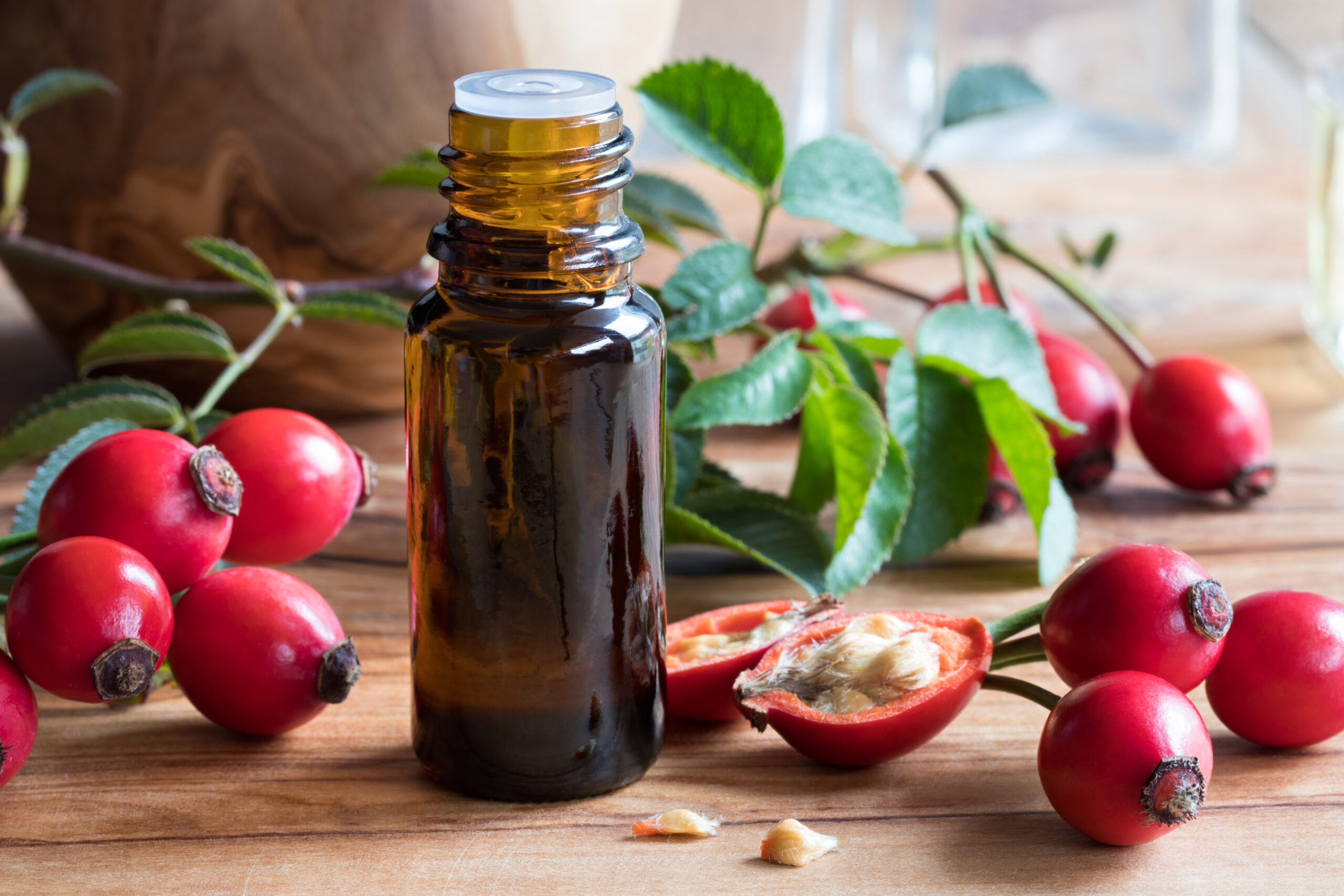Rosehip oil has a long history as a therapeutic remedy and beauty product. It’s loaded with vitamins, antioxidants, and essential fatty acids that are all prized for their ability to nourish the skin. Don’t confuse it with rose oil which comes from rose petals, rose hip seed oil, comes from the seeds of rose hips. Rose hips are the fruit left behind after a plant has flowered and dropped its petals. The rosehip oil we use is extracted using an organic cold-press extraction process. Dried rosehips can also be consumed as a tea.

Rosehip oil has significant anti-aging benefits for your skin. These benefits come from its high antioxidants and ability to penetrate deeper layers of the skin, where it can improve moisture levels and reduce visible signs of aging. When applied externally, rosehip oil protects the skin and increases cell turnover because it contains beta-carotene (a form of vitamin A) and vitamins C and E, which are all antioxidants that help fight free radicals. Rosehip Oil’s healing properties are due to its chemical structure, specifically healthy fats, oleic, palmitic, linoleic and gamma linolenic acid. It also contains polyunsaturated fatty acids (vitamin F), which when absorbed through the skin are involved in cellular membrane and tissue regeneration. It is also one of the richest plant sources of vitamin C which makes it a great product for fine lines and overall skin care. Collagen production naturally slows down as we age, but thanks to the high levels of vitamin C in rose hips, this is an oil that can help stimulate collagen production in the skin.
For a safer, organic solution to repair the skin’s surface and restore elasticity skip chemicals and Botox and simply add rosehip oil to your skin care routine.
Summary of Anti-Aging Benefits:
Protection from Age-Spots
The antioxidants found in rosehip oil, especially the combination of vitamins C and E, can help combat free radicals that cause sun damage. It also helps get these antioxidants internally by including them in your diet. Dried rosehips can also be consumed as a tea.
Helps with Stretch Marks and Reduces Acne Scarring
The cold-pressed fats found in rosehip oil can help get rid of scars and reduce the appearance of stretch marks by promoting skin regeneration. When applied topically, the fats act as emollients, helping soften the skin while also increasing hydration.
Boosts the Immune System
Rose hips are one of the best plant sources of vitamin C, which helps treat infections and boost immune function. Besides being an antioxidant, vitamin C is responsible for collagen production in the body, which is an important element in the structure of bones and muscles. Reports indicate that the important nutrient also aids in the proper absorption of iron that produces red blood cells. Drinking organic rosehip tea, is a great, easy way to do this.
It hydrates
Rosehip oil contains a wealth of essential fatty acids, including linoleic and linolenic acid. Fatty acids help to keep cell walls strong so that they don’t lose water. The many fatty acids in rosehip oil make it an excellent option for hydrating dry, itchy skin. The skin also easily absorbs the oil, allowing its antioxidants to travel deep into the skin’s layers.
It moisturizes
Rosehip oil is a dry, or nongreasy, oil. This makes it a great natural moisturizer for all skin types.
It helps exfoliate and helps brightens skin
Rosehip oil is high in vitamins A and C. Vitamin A, or retinol, encourages skin cell turnover. Vitamin C also aids in cell exfoliation and regeneration, boosting overall radiance.
It helps reduce inflammation
Rosehip is rich in both polyphenols and anthocyanin, which may help reduce inflammation. It also contains vitamin E, an antioxidant known for its anti-inflammatory effects.
It helps reduce hyperpigmentation
Rosehip oil also contains both lycopene and beta carotene. These ingredients have skin-lightening properties, making them common ingredients in many skin-lightening products.
Rosehip Tea
To brew, place 1–2 teaspoons of dried rose hips in an infuser and submerge it in a cup (240 ml) of boiled water. Steep for 10–15 minutes and then remove the infuser.
If you find the tea too tart, try adding a sweetener like honey to help balance out the flavor.
Rosehip tea tastes delicious both freshly brewed and iced.
See below several scientific studies showing the benefits of rosehip oil. It reasonably affordable and easy to use, and it’s considered generally safe for all skin types.
- The role of vitamin C in pushing back the boundaries of skin aging: an ultrasonographic approach – PubMed (nih.gov)
- Therapeutic Applications of Rose Hips from Different Rosa Species (nih.gov)
- Anti-Inflammatory and Skin Barrier Repair Effects of Topical Application of Some Plant Oils (nih.gov)
- Rose Hips (uvm.edu)
- The effectiveness of a standardized rose hip powder, containing seeds and shells of Rosa canina, on cell longevity, skin wrinkles, moisture, and elasticity (nih.gov)

